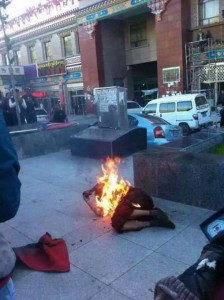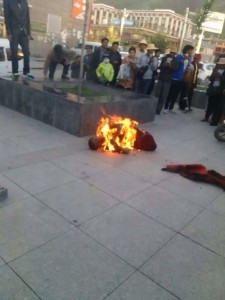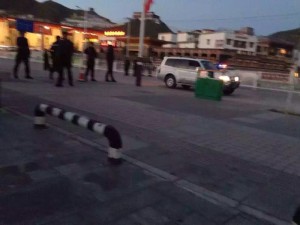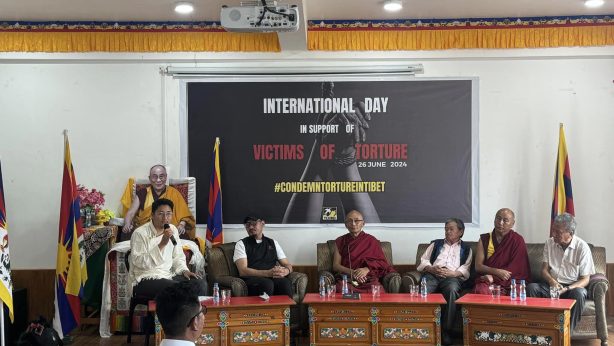Monk stages burning protest in remote Tibetan town as China imposes Internet blockade

A Tibetan monk self-immolated on 9 July 2015 in the eastern Tibetan province of Kham.
Sonam Topgyal, the 26-year-old monk, staged his self-immolation protest at approximately 6 pm local time in the Gesar Square located in Kyegudo town, in Yulshul (Ch: Yushu) Tibetan Autonomous Prefecture (TAP), Qinghai Province.
“A large contingent of Chinese security forces immediately arrived at the spot of the self-immolation and blocked all the main roads,” a source with contacts in Tibet told the Tibetan Centre for Human Rights and Democracy (TCHRD).
The Beijing-based Tibetan writer Woeser reported on her social media pages that a large number of special paramilitary troops had been sent to Kyegudo soon after self-immolation; they have since blocked the main roads leading to the spot of the self-immolation. All communication services, including telephone lines and Internet, have been shut down in the area.
Recently, Chinese authorities have blocked all Internet lines in Golog (Ch: Guoluo) TAP (Qinghai Province), 11 counties of Kardze TAP (Sichuan Province), and some parts of Ngaba (Ch: Aba) TAP (Sichuan Province). It has been more than half a month since this Internet blockade, making it difficult to get immediate updates on the situation in these areas.
It is not known whether Sonam Topgyal is dead or alive. According to other sources, the monk survived the self-immolation and was taken away to an unknown hospital. Son of Mr Tashi, Sonam Topgyal comes from Nangchen County (Ch: Nangqian) in Yushu TAP. He studied Buddhism for seven years at Dzongsar Monastery in Derge (Ch: Dege) County in Kardze (Chinese: Ganzi) TAP in Sichuan Province.
Some pictures of the self-immolation have become available. At the time of the self-immolation, a number of local Tibetans, with some sources putting the number at close to 100, had gathered at the spot.
Sonam Topgyal is the sixth Tibetan to commit self-immolation this year. Since 2009, a total of 142 Tibetans have turned to self-immolation as a form of protest against the Chinese government’s repressive policies in Tibet, with an overwhelming majority calling for the return of their spiritual leader His Holiness the Dalai Lama. Others have also called for freedom, human rights, and the independence of Tibet.

On 14 April 2010, Kyegudo town, where Sonam Topgyal self-immolated, was struck by a devastating earthquake that killed 3000 people according to official figures and destroyed much of the town’s infrastructure.
Since the earthquake, tension and discontent have been mounting in this Tibetan town due to the frequent cases of land grabbing by local Chinese authorities for Chinese government projects, which provide little benefit to local Tibetans.
As a result of the corrupt ties between developers and local Chinese authorities, Tibetans are being dispossessed of housing plots that they have owned in Kyegudo town for generations. These Tibetans are now being forced to relocate to the outskirts of town, often with inadequate or little compensation.
In 2012, amid a wave of protests and petitioning by Tibetans in Kyegudo town calling for justice, Dickyi Chonzom, a mother of two, carried out a self-immolation in protest. The Chinese police immediately removed her from the site of her protest. To date, her condition remains unknown.

Last Wednesday, the US House of Representatives urged the Chinese government to improve human rights in Tibet in a bi-partisan resolution. They also encouraged the Chinese government to restart negotiations with the representatives of the Dalai Lama to resolve the Tibet issue.
TCHRD is deeply distressed by the ongoing self-immolation protests by Tibetans and calls on Chinese authorities to put an immediate halt to policies that are the root-cause of these protests. TCHRD recognizes that self-immolation protests are the most explicit evidence that Chinese policies in Tibet have become repressive as well as fatal. Worse, Chinese authorities have refused to take any responsibility for the loss of lives and the anguish these protests have caused to self-immolators, and their friends and family members. Instead, Chinese authorities have raised the level of repression, imposing punitive measures such as collectively punishing family members and friends of the self-immolators by subjecting them to arbitrary detention, interrogation and torture.
TCHRD remains deeply concerned about the condition of Sonam Topgyal, and urges Chinese authorities to refrain from implementing collective punishment on his family members, fellow monks and friends.


